COVID message: Wake up India!
Updated On: 26 April, 2021 07:10 AM IST | Mumbai | Ajaz Ashraf
Amid moving visuals of patients gasping for breath and overfilled crematoriums, we need to realise that a narrative can never be a substitute for good governance, that not to be too trusting of leaders is an essential condition to ensure democratic accountability

We were too busy imagining the future promised to us to even notice death, bearing the name of SARS-CoV-2, creeping upon us. Pic/PTI
Every crisis scrambles a message that people must decipher. But such a challenge the second wave of COVID-19 does not pose, for the message to us should be loud and clear: Wake up India! For far too long its people have mistaken slogan for intent, spin for truth, and acronym for skill in governance. For far too long we have been under the spell of Prime Minister Narendra Modi, who has mesmerised us with his incessant chatter of making India the Vishwa Guru — teacher for the entire world — and turning its economy into a $5 trillion one.
We were too busy imagining the future promised to us to even notice death, bearing the name of SARS-CoV-2, creeping upon us. And now, our eyes well up as people die for the lack of hospital beds and oxygen supplies, and crematorium staff work overtime to perform the last rites of the dead. We shudder at the thought of contracting SARS-Cov-2, wondering whether we can access medical help in an emergency.



